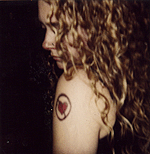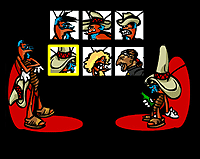SilverTech isn't just eKIDS. Forging into the realm of secure Web transactions, the company is just beginning by conquering the sensitive kids online issue that has foiled many others. Gregory Singer reports. Includes sample Flash animations!

What you'll find on eKIDS Internet's main page. © SilverTech Inc.
When folks think of cartoons and animation, almost universally we think of kids. Once in my wanderings I came across a T-shirt on a toddler which read: "I am not a target audience." However quaint or poignant such a message may be, the fact remains that animation and children are closely associated -- if not always in our marketing schemata, then certainly in our collective cultural imagination.
The "eKIDS Internet" is the fledgling and ambitious enterprise of SilverTech, Inc., and it aims to be, as it explains self-promotionally, "The place where kids click with kids."

El St. John, founder and CEO. In her first endeavor using PIE technology, she created eKIDS Internet, the world's first private Internet network for kids featuring its own browser and search engine. Photo courtesy of and © SilverTech Inc.
Founded in 1997 by former telecommunications executive El St. John, San Francisco-based SilverTech officially and globally launched its operations in February 2000. At the gleeful age of 67, El St. John has an extensive and varied background, from runway modeling and race car driving, to advertising, marketing and documentary filmmaking. At technology conferences and meetings -- standing out among the stereotypically youthful, predominantly male crowd -- St. John offers a compelling and unique vision among founders of Internet start-ups. St. John has, first and foremost, a passion for kids, and she wants to create a place for children to be safe and secure as they experience the online world. St. John says, "There must be a way for people to take advantage of the ease, accessibility and convenience of the Internet within a safe, protected microcosm."
During the past three years, in collaboration with her husband, a physicist at Intel Corporation, St. John has devoted her energy and resources to pioneering this effort, in developing her company's patented Private Internet Engine (PIE).

Greg Boegner, Vice President, Business Development, is responsible for identifying and acquiring content for eKIDS Internet, representing the company at various trade shows and conferences, as well as leading marketing, advertising and public relatio
Greg Boegner, Vice President of Business Development for SilverTech, and a former media producer for NASA's Johnson Space Center, explains, "This is proprietary technology that uses encryption from end to end; it starts where the connection meets a user's computer, encrypts the lines all the way into our servers, where there is layer upon layer of firewalls."
St. John adds, "The PIE technology provides a service which is flexible and virtually impenetrable, offering the primary benefits of the Internet without the public risks." In creating safe and secure online environments, the technology can be applied to other industries and businesses; military, legal and medical professions, as well as government, financial and educational institutions.
SilverTech must have hit upon the right electronic nerve, because they have already raised $10 million in seed money from angel investors, and received substantial pecuniary and hardware investments from such companies as Hewlett-Packard and Cisco, which provides all of their servers and networking infrastructure. Other strategic partnerships have been established with AboveNet, Ask Jeeves and Headbone Interactive.
Easy as PIE
The eKIDS network, therefore, is the inaugural effort of SilverTech's PIE technology. Install their software on your computer, register and you're tapped in. It's that simple.

View the Flash animation game, It's Fishy featured on eKIDS Internet and created by Bevin Stone. © SilverTech Inc.
In one click, you're stuffing your face with low-res graphics games and participating in fart jokes, and in the next click you are reading about the basal plane and crystallography of snowflakes. In its current incarnation, eKIDS tries to cater to the interests of youngsters ranging in ages from 4 to 19. So you can imagine what kind of juggling act this entails. But amidst its rough outlines, gems of ideas are slowly realized. Kids can learn how to cook, tune up a car, take care of a pony, make a simple camera, or stretch a canvas for oil painting
Julie Garrard, creative director of the original animation and games on eKIDS (ages 4-12), says, "What we're trying to do is have something that's educational and fun, but also have stuff that encourages kids to do things that aren't necessarily on the computer." Garrard, a self-described enfant terrible, adds, "You gotta make them think and then want to go out and do stuff for themselves."

Julie Gerrard, creative director of eKIDS oversees the creation and production of original animation and games on eKIDS Internet. Photo courtesy of and © SilverTech Inc.
Currently, with almost thirty sections or "e-centers" to explore, there's no lack of encouragement or inspiration for kids. Garrard's department, in the last six months, has already made over 100 games, cartoons and activities to complement the e-centers. Once a month, kids can talk with the eKIDS animators in the chat rooms to share ideas on what future games and toons they may like to see.
There is, for example, a poetry mic -- a take on the paper-and-pencil Mad Libs game of yore, where kids can choose from dialogue that is then read, in a very bad French accent, by an animated character.
Commenting on one of her favorite recent creations for the network, Requiem for a Turkey, Garrard notes, "One of the reasons this stuff works so well for kids is we're not coming from a normal adult perspective on it. We're trying to be silly, irreverent and not talk down to kids."
The eKIDS animators, with a median age of 25, all come from backgrounds in traditional, cel animation. As Garrard explains, unlike other studios where production may center around a client's properties, the eKIDS animators are given a fairly "long leash" to create what they want. Occasionally they are reigned back in, but for the most part they have the freedom and creativity to produce the content as they like. The general feeling and consensus is that, if the animators are not having fun, the kids won't be having fun.

View eKIDS' Flash animation game, The Nasty Mariachi vs. The Evil Cucarachas, created by Rogelio Ramirez and SteveMedoff. © Sil
Delving through the network, you continue to come across, like an echo, all of the familiar sights and sounds of the larger World Wide Web; everything from music, magic and martial arts to learning origami and yoga to banking, traveling and even practicing your technique as a video editor. During the next turn, you find yourself back again among the playful pedantry of your youth: squishing cockroaches, pampering Santa with peckish kisses and back-scratching candy canes and setting characters on fire with lightning bolts.
In total, El St. John intends for the eKIDS Internet to be a self-contained, friendly, kid-only zone. It sprawls all over the place, affording children not only the opportunity to peer their heads into the museums of the world (exposing them to the breadth of human history and geography), but also encourages them to participate; to submit, for profile and exhibition, their own creations and ingenuities be it drawings, music or otherwise.
Having a Finger in the PIE
With activities and games fashioned after everything from punk mosh pits to playing dress-up with beauty products, what else distinguishes or differentiates eKIDS from such other online destinations as Nick, Disney, Rumpus or ThinkBox?
While it is initially suggested that the eKIDS service will cost $12 per month, it is essentially a free Internet network, so long as kids keep recommending it to others. The first six months are offered for free, and subsequent six-month "subscriptions" are also free, for every child one may refer to the site. SilverTech generates its revenue through corporations and sponsorship sales, and the $12 price tag is meant for kids to understand the value of the network, not to preclude anyone from being able to participate in it. Ideally, St. John wants all kids to have access to the site; she doesn't want it to become an elitist kind of service for affluent kids.
The basic idea is that eKIDS is selling to parents. It is offering them the peace of mind that their kids can maneuver in an online environment without being exposed to any inappropriate material, either intentionally or accidentally, and without the fret or threat of them being exposed to predatory behavior. Online destinations for children are generally and primarily entertainment-based, whereas eKIDS seeks to emulate an entire Internet -- the whole shebang -- complete with communication (email and chat), education, entertainment, news, and a kid-friendly browser and search engine (which already boasts at least 140,000 Websites cached on its server).
SilverTech is drawing the attention of parents and children to their eKIDS Internet through an intensive promotional and marketing campaign. In free parenting publications -- mostly in the Northeast right now, in such areas as Massachusetts, New York and Minnesota -- SilverTech is offering free CDs to register for the service. Radio Disney, syndicated around the U.S., is running ad spots for eKIDS. At special events in metropolitan areas (zoos even!) free discs are also being handed out. The eKIDS Internet is sponsoring the Pokemon Live stage show which debuted last September at Radio City Music Hall, and is now touring North America. There has been a back-to-school promotion with Hewlett-Packard, Office Depot and Staples this past fall as well. And an in-school, online safety promotion has also been set up. eKIDS created a "homework folder" with information for both kids and parents on how to be safe using the World Wide Web; again, there is a free CD included with each promotional folder. In all, there will be roughly 12 million discs in circulation by this March.

View the Flash animation game, Moshpit featured on eKIDS Internet and created by Rogelio Ramirez. © SilverTech Inc.
The Square Route of PIE
Having recently returned from a media conference in London, business development executive Boegner speaks comfortably and confidently of SilverTech's future position in the growing global marketplace. While their first efforts have been in establishing a safe, sequestered environment for children's education and entertainment, SilverTech is poised to be a leader in bringing confidentiality and security to the vastly expanding online universe. Other businesses and professions are seeing the benefit of such tailor-made, safe havens for exchanging and sharing information, and European media and telecom companies are eager to jump on the opportunities the Internet may provide, particularly with respect to children.
Boegner admits that the eKIDS network is going through its growing pains now -- that the content is somewhat limited and rudimentary and the idea of creating an entire, private Internet is daunting. But, as the saying goes, one has to start somewhere, and the eKIDS Internet, if nothing else, does hint at the potential of the PIE technology. Undoubtedly, as the service becomes more popular, SilverTech will have increasing resources to develop, acquire and Web-enable their content, as, for example, they recently have done with Artisan's Tangerine Bear and UNICEF's Meena series.
Soon children in France, Germany and the United Kingdom will also come online with their own e-centers, and kids from around the world, who do not necessarily share a common language, will be able to communicate with one another directly, through software translation applications.

See how Yoffe the wonder dog saves the day in a Flash animated short created by O.J. San Felipe and Steve Medoff featured on eKIDS Internet. ©
In the coming months, eKIDS itself (ages 4-12) will spin off into separate Internet engines, "eTeens" (ages 8-13) and "24-7 Edge" (ages 14-18).
As the World Wide Web continues to evolve and thrive, the climate of concern for the protection of information also grows. As El St. John explains, "Those 'public streets' are not where everyone wants to do business, especially when commercial interests and privacy issues are at stake." People want to feel more secure in their online activities. In short order, SilverTech will be providing full, online resources for researching materials, holding client information confidential and mediating other Internet-based enterprises. We can look forward to such PIEs as eLawyer, eMedical, eShipping, eDistributor (a private network for selling electrical parts), and eEducation (a private network for distance learning).
There is nothing "pie in the sky" about it. SilverTech means business.
Gregory Singer is a freelance writer and amateur scientist, in feverish midnight pursuit of a cure for the common pun.







